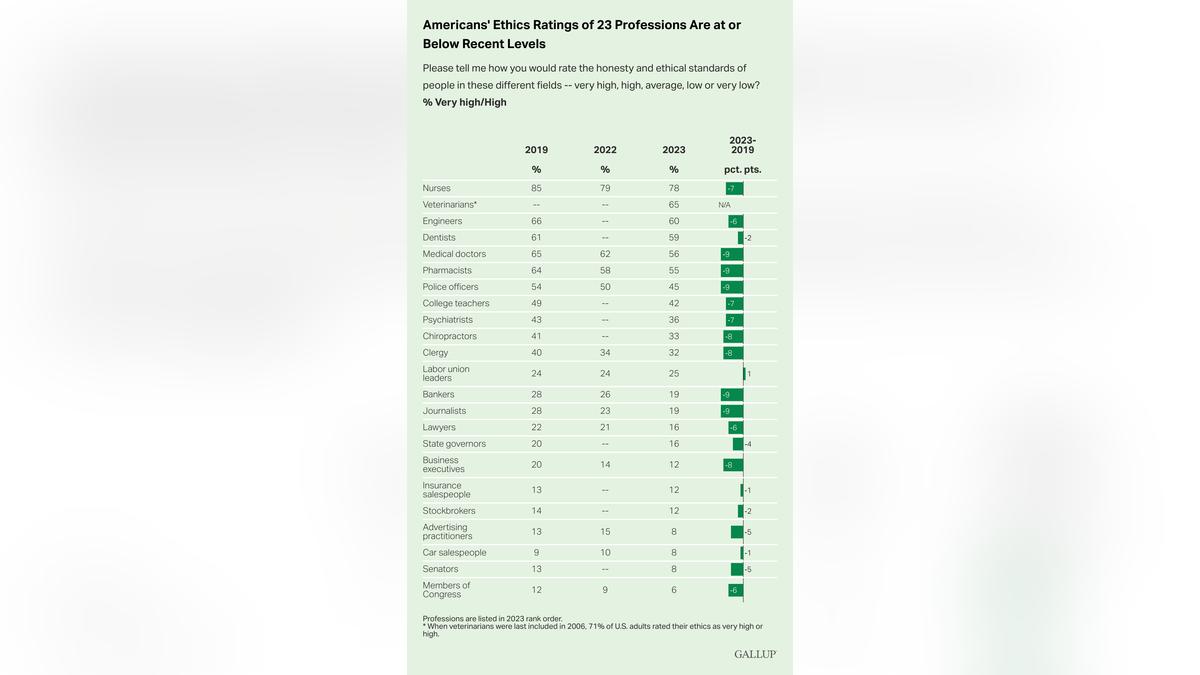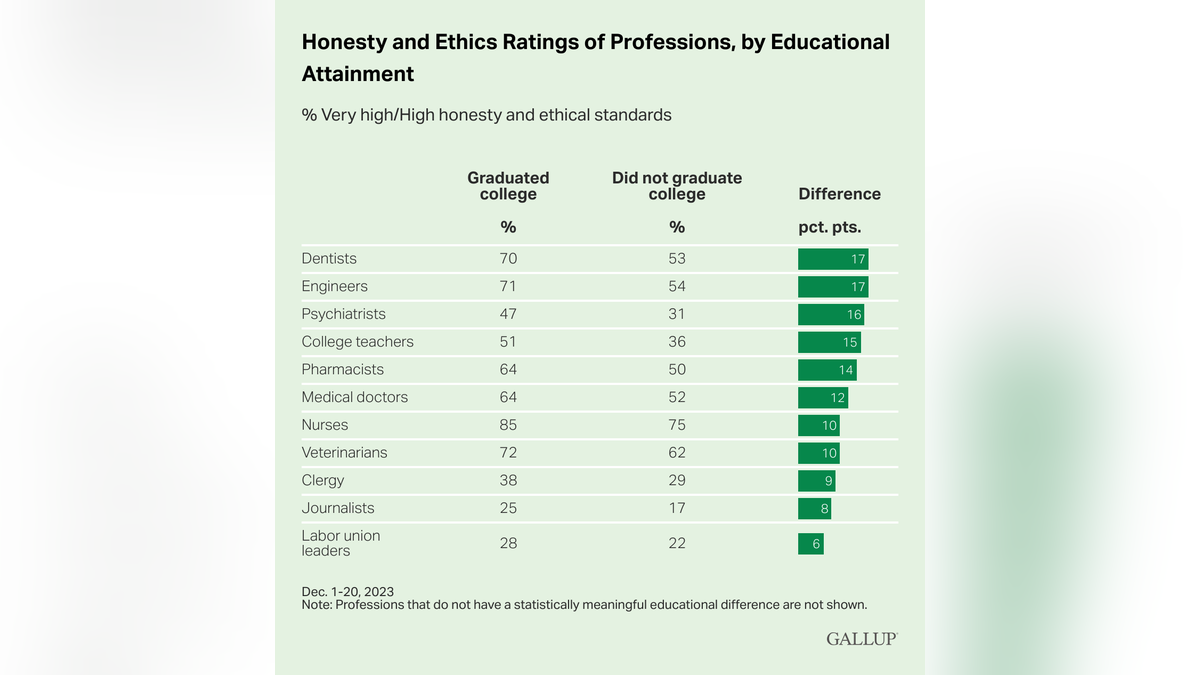Workers across the globe are starting to reassess what’s more personally important to them: an improved work-life balance or taking home more pay.
According to a recent survey from U.S. automaker Ford, 52% of polled employees worldwide said they’d take a 20% pay cut to achieve a lifestyle that prioritizes their quality of life. The percentage of Americans who feel the same isn’t too far off, at 51%.
And while Ford noted those polled say they still feel connected to their professional roles, they acknowledge a stressful job may be worth leaving behind. Seventy-nine percent of U.S. baby boomers, 72% of Gen X, 63% of millennials, and 66% of Gen Z agree it’s not worth working a job that increases stress levels.
Ramsey Solutions personality and career expert Ken Coleman previously told FOX News Digital that America’s job culture is changing, mostly thanks to trends brought on by the youngest of employees.
"I think this will be the generation that ushers in the four-day workweek. I think this is the generation that will mark a truly hybrid reality," Coleman said.
"Older generations, please follow my lead on this," the career expert added, "because you're going to have to lead these young people, and they're rock stars in this generation. They're coming to the workplace with a whole different lens on society and life in general, and you have to deal with that. Don't gripe about it."

Fifty-one percent of American employees are willing to take a 20% pay cut if it means a better work-life balance, according to a Ford survey. (Fox News)
And receiving less pay may mean working for longer – in 2023, more American retirees have returned to full or part-time work, about 20% year-over-year, according to AARP. Coleman predicted that this number may increase.
"I recently read some data that hiring managers are less willing to hire a member from the Gen Z generation, and they're more likely to hire someone in their 60s," the career expert pointed out. "And the reason for that is because they feel like they're going to get somebody with a good work ethic who is there because they need to be there, and thus they want to be there."
"Then, the added bonus of good locker room influence," he continued, "A positive influence for the younger players because of the work ethic and the experience wisdom they bring. And I think you're going to see this in corporate America."
Looking ahead to the future, many workers (60% globally) see artificial intelligence (AI) as a positive influence on work-life balance. The Ford survey found that 69% of worldwide millennials and Gen Z workers will trust A.I. to provide career advice in the next five years.
This was not a great jobs report: Ken Coleman
'The Ken Coleman Show' host Ken Coleman argues don't get 'stuck in the headlines' as he discusses the December jobs report on 'Cavuto: Coast to Coast.'
"The most prescient opportunity in 2024 is A.I. and A.I. tools," LinkedIn’s Andrew McCaskill also told FOX News Digital. "I think that there's so many more people who are looking for A.I. skills and looking to see workers be able to not be afraid of A.I. tools, and to actually lean into them."
"And you can do that right now and get so far ahead of the game, even today, from the comfort of your own home," McCaskill added. "And I think that that's where the future is going."
Echoing some of the survey’s sentiments, Coleman expanded on the importance of choosing a job not solely based on its impact on your wallet.
US job market isn't having 'true organic prosperity': Charles Payne
'Making Money' host Charles Payne reacts to cautious markets ahead of the release of December's jobs report.
"You can control your effort. You can control your attitude. You can control the type of contribution that you want to make to the world. And yet, you can't control the economy. You can't control layoffs. You can't control maybe having a really bad leader or bad manager," the Ramsey personality listed.
"My advice in 2024 is: head down as you are focused on getting better," Coleman said. "Don't just work to get a paycheck. Work on yourself as much as you work on your job. Upskill, connect like your life depends on it, and keep your head up and on a swivel for opportunities."
Robert Half Inc. (NYSE: RHI) reported that it sees a more positive backdrop heading into this year when it announced fourth-quarter earnings on Jan. 30, though Q4 revenue fell 15.2% year over year when adjusted for the effects of currencies and billing days.
“We delivered above-consensus top-and bottom-line results for the fourth quarter, with Protiviti leading the way,” President and CEO M. Keith Waddell said in a press release. “Global labor demand continues to be resilient, and talent shortages persist, although both are modestly below their peaks. We are encouraged that our improving weekly revenue trends that began in the third quarter and continued into the fourth quarter are approaching a positive inflection point.”
In the company’s Protiviti division, revenue fell 7.5% on an adjusted basis, which includes adjustments for currency impacts and billing days.
Overall, perm placement revenue at the professional staffing provider fell 22.6% on an adjusted basis, while contract staffing revenue fell 17.7%.
Looking at Robert Half’s revenue by geography, US revenue was down 16.7% year over year on an adjusted basis in the fourth quarter. International revenue was down 9.8%.
Waddell noted in a conference call with analysts that job-opening demand remains above historical levels and candidate supply remains tight.
“The Great Resignation following Covid has given way to the Big Stay, and employee attrition is down significantly across the globe. That said, the tone of client discussions has improved in the last 90 days due to some combination of lower inflation, a more favorable interest rate policy, fewer predictions of pending recession, and newly approved staffing levels resulting from the annual budget cycle,” Waddell said. “These factors contribute to a more positive backdrop heading into 2024 than we saw a year ago.”
Click image to enlarge.
Guidance
Robert Half forecast first-quarter revenue of between $1.44 billion and $1.54 billion, a year-over-year decrease of 13% at the midpoint on an adjusted basis.
Share price
Shares in Robert Half were down 2.71% to $79.20 as of 1:39 p.m. Eastern time today. They were 11.78% below their 52-week high.
LinkedIn beat revenue expectations in its fiscal second quarter ended Dec. 31, 2023, according to parent company Microsoft Corp. (NASDAQ: MSFT).
“LinkedIn revenue increased 9% and 8% in constant currency, ahead of expectations driven by slightly better-than-expected performance across all businesses,” Microsoft CFO Amy Hood said in a conference call with analysts. “In our Talent Solutions business, bookings growth was again impacted by weaker hiring environment in key verticals.”
LinkedIn revenue was $4.19 billion for the quarter.
“LinkedIn is now helping over 1 billion members learn, sell, and get hired,” Microsoft CEO Satya Nadella said in the conference call. “We continue to see strong global membership growth, driven by member sign-ups in key markets like Germany and India.”
LinkedIn members are also building their skills, and 680 million have been added to profiles over the last 12 months, Nadella said. That’s an increase of 80% year over year.
AI-powered features, including more personalized InMails, are transforming the LinkedIn member experience, he said.
Total second-quarter revenue at Microsoft rose 16% in constant currency to $62.02 billion.
A regulatory filing noted that Microsoft is challenging a preliminary draft decision, including a fine, in a case where the Irish Data Protection Commission alleged LinkedIn’s targeted advertising violated the European Union General Data Protection Regulation. Microsoft said it cooperated with the investigation, which resulted in the preliminary draft decision being issued in April 2023. There is no set timeline for the Irish Data Protection Commission to issue a final decision.
In nurses, Americans trust — even more so than doctors.
That’s according to Gallup’s 2023 Honesty and Ethics poll, which ranked 23 major professions by the level of trust U.S. adults place in them.
Nurses hold the top spot as the most trusted profession, with 78% of Americans who took part stating that they adhere to "very high" or "high" standards for honesty and ethics, according to a press release from Gallup.
LESS THAN HALF OF NURSES ARE ‘FULLY ENGAGED’ AT WORK, WHILE MANY ARE ‘UNENGAGED,' NEW REPORT REVEALS
This is the 22nd consecutive year that nurses have been ranked as the most trustworthy.
Overall, nurses’ trust ranking has dipped by 7 percentage points since 2019, but is still higher than dentists (59% trust rating in 2023) and medical doctors (56% trust ranking).

Nurses hold the top spot as the most trusted profession, with 78% of Americans stating that they "very high" or "high" standards for honesty and ethics, according to a press release from Gallup. (iStock)
Lower in the healthcare trust rankings were pharmacists (55%), psychiatrists (36%) and chiropractors (33%).
Pharmacists saw a record-low trust ranking this year, the poll found.

Overall, nurses’ trust ranking has dipped by 7 percentage points since 2019, but is still higher than dentists (59% trust rating in 2023) and medical doctors (56% trust ranking). (Gallup)
College graduates reported higher levels of trust for most of the professions.
In health care, the biggest disparities were for dentists (70% among college graduates and 53% for those who did not graduate), psychiatrists (47% versus 31%), pharmacists (64% versus 50%) and medical doctors (64% versus 52%).

College graduates reported higher levels of trust regarding most of the professions, the Gallup poll found. (Gallup)
Gallup has been conducting this poll since 1976, with annual updates starting in 1990, the release stated.
For this most recent ranking, researchers polled about 800 U.S. adults between Dec. 1 and Dec. 20, 2023.
Annette Wysocki, Ph.D., dean of the University at Buffalo School of Nursing, who was not involved in the poll, noted that nurses play a "crucial role" as the health care providers who spend the most time with patients.
"In moments of vulnerability, patients disclose details to nurses that they've never shared with any other health care provider and trust that nurses will advocate for them," Wysocki told Fox News Digital.
"With the highest level of interaction among all health care professionals involved in a patient's care, nurses become the patient's voice and adeptly navigate health care systems to ensure the best outcomes for them," Wysocki went on.
"Thus, research demonstrates that baccalaureate-prepared nurses lower the odds of hospital mortality by 25%."

"In moments of vulnerability, patients disclose details to nurses that they've never shared with any other health care provider and trust that nurses will advocate for them," a nurse told Fox News Digital. (iStock)
Regina Foley, chief nurse executive at Hackensack Meridian Health in New Jersey, also provided an external reaction to Gallup’s findings.
"Nurses are at the forefront of patient care, which allows for deep and meaningful connections with patients," she told Fox News Digital.
"They not only provide extraordinary clinical care, but nurses also act as advocate, intermediary, and counselor," Foley also said.
"With clear competence and remarkable compassion, our nurses are there for our patients in their darkest, most challenging hours."
"Given the crucial role they play in a patient’s care, well-being, education, and recovery, it is no surprise that nursing has been consistently recognized as the most trusted profession," she added.
Lisbeth Votruba, an RN with AvaSure, a Michigan-based company that offers real-time patient monitoring and virtual nursing services, is a third-generation nurse and is proud of the profession’s trustworthiness.

"In the past, nurses did not have influence to match that level of trust," a nurse told Fox News Digital. "I see trends to show this is changing." (iStock)
"In the past, nurses did not have influence to match that level of trust," Votruba told Fox News Digital.
"I see trends to show this is changing. Many of the IT-focused healthcare conferences are adding a nursing track for the first time in 2024," she said.
"There are more and more nurses like myself, who sit on the senior leadership team of technology companies to be sure the voices of nurses and patients are heard as technology is being designed."

.webp)



